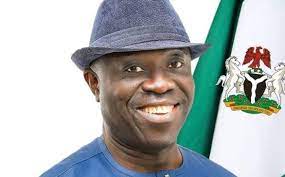By Stanley Ebube
Since its inauguration by the National Security Adviser (NSA) Maj.-Gen. Babagana Monguno (rtd) on December 6, 2022, the Special Investigative Panel on Oil Theft/Losses in Nigeria has been traversing the country, especially the Niger Delta region, in search of answers to the questions posed by the incessant crude oil theft which has characterised the exploration and marketing of Nigeria’s petroleum resources.
During the inauguration, the NSA said the panel was expected to investigate oil theft/losses in all its ramifications and propose a wide-ranging array of implementable recommendations to enable the federal government to take decisive action to end the criminal enterprise within the shortest possible time.
Chaired by Maj.-Gen. Barry Ndiomu (rtd), who is also Interim Administrator of the Presidential Amnesty Programme (PAP), the special investigative panel was given till February 21, 2023, to conclude its investigation and submit its report.
The setting up of the panel was greeted with optimism and enthusiasm by a large section of Nigerians, who look forward to the panel’s report. For instance, the Nigeria Extractive Industries Transparency Initiative (NEITI) has welcomed the decision to set up the panel, describing it as bold, courageous and timely “given the havoc oil theft has wrecked in oil production and the country’s revenue generation”. NEITI also commended the Office of the National Security Adviser (ONSA) for coordinating the investigation and its wisdom to appoint NEITI to the panel. “This is in view of the agency’s strategic relevance to guide the panel with reliable information and data,” the agency said.
Ndiomu has said on several occasions that the panel would not be afraid to identify and expose those involved in the economic sabotage called crude oil theft. He always emphasises the commitment of the panel not only to identify but also to recommend appropriate, commensurate and sufficient deterrent sanctions on all those culpable in line with the panel’s terms of reference.
However, while the majority of Nigerians are optimistic about the work of the special panel, there are a few isolated voices who continue to question the appointment of Ndiomu as chairman of the panel. Those sparse voices, obviously lacking knowledge of or experience with the concept of national security and efficiency in coordinating it, argue that there is no valuable relationship between the position Ndiomu holds as interim administrator of PAP and his ad hoc role as head of an investigative panel looking into crude oil theft.
The PAP is a disarmament, demobilisation and reintegration (DDR) programme initiated in 2009 to address youth restiveness, militancy and destruction of critical national infrastructure in the Niger Delta region of the country. The activities of ex-militants, which led to PAP as a DDR programme, were threats to national security. In essence, DDR is fundamentally a precondition for ending armed conflict, securing stabilisation and initiating a process leading to sustainable development.
One of the key components of the mission of PAP is to: “Coordinate and cooperate with relevant agencies set up by the Federal Government of Nigeria to complement the efforts of the Amnesty Programme to ensure the development and security of the Niger Delta in line with the broader Amnesty Package.” Interestingly, one of the ToRs of the investigative panel is to: “Assess the efficacy of security architecture/arrangement in tackling crude oil theft/losses and associated petroleum products.”
NEITI has said, based on information and data provided by an average of eight companies it processed over the years, losses recorded in the petroleum sector were a result of theft and sabotage. It is, therefore, clear that both PAP and the investigative panel are responses to national security threats in the petroleum sector and both are being supervised by ONSA for a reason. PAP houses 14 years of data collected on security threats in the Niger Delta and deals directly with some of the state and non-state actors involved in those threats. It is, therefore, a no-brainer for its interim administrator, who has direct access to such an enormous pull of data, to be appointed as chairman of an investigative panel seeking to address yet another issue of national security in the same sector. With the short time given to the committee to submit its report, appointing someone with access to such data guarantees seamless access to critically needed data.
Contrary to what naysayers hold against him carrying out two complementary roles as PAP interim administrator and chairman of the special panel, Ndiomu has so far piloted the committee’s task commendably. Just as he has done with PAP, he has led the panel on visits to critical stakeholders and has been able to garner buy-in and support. During a recent visit to the Imo State Governor, Sen. Hope Uzodimma, the panel was assured of all “necessary manpower and intelligence to help their investigations” by the governor.
There is also the issue of avoiding the usually bloated bureaucracy through the establishment of committees. The wisdom in appointing someone with an already related role to head the 11-person Special Investigative Panel on Oil Theft/Losses in Nigeria is that it provides the panel with an existing structure both in terms of personnel and logistics. Efficiency, which is achieving maximum productivity with minimum wasted effort or expense, should be applauded not criticised.
And since part of the panel’s work involves consultation, dialogue and a fact-finding mission, Maj.-Gen. Ndiomu’s experience as PAP interim administrator, coupled with his knowledge of threats to critical national infrastructure in the oil sector, makes him an ideal face of the panel.





















